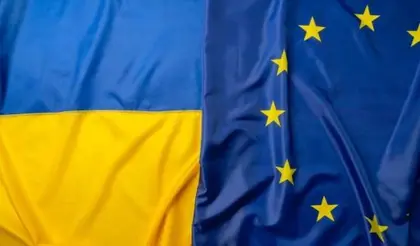Ukraine made history by becoming an EU candidate state on June 23, 2022. The decision will provide Ukrainians with an opportunity to change their future.
JOIN US ON TELEGRAM
Follow our coverage of the war on the @Kyivpost_official.
Since the Euromaidan protests in 2013-14, Ukrainians have pursued efforts to integrate with Europe. They rewrote the Constitution of Ukraine to specify their desire to join Western institutions and organizations. The Ukrainian government has also implemented numerous anti-corruption reforms to comply with EU standards.
Ukraine’s continued efforts were commended by the EU, leading to Ukraine being granted visa-free travel in 2017 and EU candidate status in 2022.
Now, Ukraine has continued down its path toward full integration. What has transpired in the six months since this Eastern European state was granted EU candidate status?
Each year, the European Council "adopts conclusions on enlargement and the stabilization and association process." In its recent report, the Council provided its observations on Ukraine and its anti-corruption efforts. The Council acknowledged that this Eastern European state was making progress. It also encouraged Ukrainians to meet the conditions outlined in its list of recommendations. Finally, the Council proposed that the European Commission create a roadmap outlining steps to "ease Ukraine’s access to the EU single market."
One example is that Ukraine has worked tirelessly to reform its judiciary system. Earlier this month, the Ukrainians appointed new members to Ukraine’s High Council of Justice. The Verkhovna Rada (Ukraine’s Parliament) has also passed the "legislation sought by the EU," one of the seven recommendations provided to Ukraine by the EU. Should the Ukrainians continue their success in this effort, it will take them one step closer to full EU membership.
A second example is how Ukraine promoting transparency and reforming its government. In the course of Russia’s ongoing invasion, Ukraine has received billions of dollars worth of humanitarian, financial, medical, and defense aid from the international community. To demonstrate that this assistance is being put to good use, Ukrainians have been very transparent about what they have received during Russia’s war.
Ukrainian officials are registering all the military equipment they have received from the international community. Ukrainians are also recording what they have acquired, the status and usage of this equipment, and if any hardware has been damaged or destroyed. They have also welcomed U.S. personnel to inspect their inventory, showing that they are happy to work alongside their counterparts to ensure complete transparency in this effort.
Outside of U.S. defense aid, the United States Agency for International Development (USAID) is using extraordinary measures to monitor humanitarian and financial aid being sent to Ukraine. Deloitte, a consulting firm that has a contract with USAID, has also been monitoring American support to Ukraine.
In a report it published last fall, Deloitte conducted an audit of U.S. aid received by Ukraine. In its findings, the firm concluded that there were "no significant areas of concern" for potential fraud.
Ukraine’s desire to work willingly with these organizations suggests that it understands the need for, and importance of, transparency. This continued accountability will inform international donors and countries that their aid is not being wasted, and it will encourage them to send additional investments and assistance. The United States has commended Ukraine for this work.
Finally, a third example is the Ukrainian government’s work to implement anti-oligarch laws. In June 2022, Ukrainian President Volodymyr Zelenskyy signed a law that “requires officials to declare contacts with oligarchs."
This legislation "bans oligarchs from financing political parties, political ads, or demonstrations." The law also excludes oligarchs from the "privatization of state assets." While this is an early step, the Ukrainian government continues to work with the Venice Commission and the Consul of Europe as it pursues to enact these anti-oligarch laws.
Ukraine still has a long way to go before it is eligible to begin the whole accession process. But Ukrainian efforts to continue reforming their government, especially during the ongoing war with Russia, show that the Ukrainians are fully committed and determined to join Western institutions and values. It will take time, but the future looks bright for Ukraine.
Mark Temnycky is an accredited freelance journalist covering Eastern Europe and a nonresident fellow at the Atlantic Council’s Eurasia Center. He can be found on Twitter @MTemnycky
The views expressed in this article are the author’s and not necessarily those of Kyiv Post.
You can also highlight the text and press Ctrl + Enter



